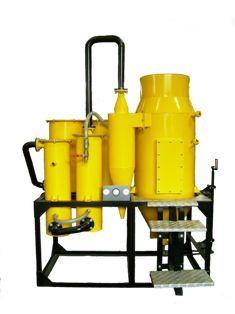| You are here : |
| Introduction To Trillion Gasifier |
 |
 |
 |
|
Gasifier technology has been in the market for a long time. However, most designs are unable to generate producer gas of the desired quality suitable for diesel engine operation. Moreover, the efficiency and high cost, both investment and operating cost, is also one of the key deterrents to the mass usage of this green technology. Using these problems as the key design criteria that our Trillion gasifier needs to overcome, our designer initiated a detailed research and study on the principle of tar formation from the combustion process involving rice husk, betel nut shell, wood chips, palm oil kernel shell and other biomass waste. The research and study involved a detailed analysis of the physical and chemical properties of tar compound generated by the various type of biomass. With this important information on hand, the next phase was spent to design and develop our state-of-the-art Trillion gasifier that has the full capability to control the formation of tar to the minimum during the combustion process. An in-depth study was also carried out to design an economical filtration system that is capable of thoroughly and efficiently cleaning up the gas to give a standard gas quality that is fully in compliance with the FAO specifications, therefore suitable for any engine operations.
Our Trillion Gasifier is designed to be tar-free and easy to operate. It is suitable for use in diesel engine power generation especially in remote areas that are far away from the grid line, for running of diesel engine driven pumps and in any other applications where diesel engine operates on a regular basis etc. The key benefits of using our Trillion gasifier can be summarized as follows: - Reduces diesel fuel consumption by 50% to 85% - Low capital investment i.e. fast payback - Easy to install and simple to operate - Compact design - Low maintenance cost - Low biomass consumption - No unpleasant smell - No engine modification required - No deration on the engine output - Will not affect the engine life span - Improved existing engine performance - Availability of carbon credit for sales Today, our gasifiers are widely used in Myanmar with more than 600 units sold in the first 18 months of launching of the product. In late December 2008, after some successful trials, the Myanmar military government invited our principal to conduct a study on the mass implementation of our gasifier for power generation to power up the lightings for the villages. The program has now been officially approved and will be implemented in phases with the first two lots of 20 units each delivered in early March 2009. We have now expanded our focus on the export market within Asia and on the demand for bigger gasifier power plant especially for factories with self-contained electric power generating plant. Such applications will not only enable the company to save on the diesel operating cost, it will also gives the company the option to sell their carbon credit. In line with our policy of continuous product improvement, we are continuously upgrading our product to make it extremely easy to operate. Our latest range of product has now incorporated a monitoring and control panel to enable the operator to easily operate and control the process within the gasifier. Additional visual and audio alarms are also added to alert the operator should any parameter exceed the pre-set level.
|
| Last Updated on Saturday, 30 October 2010 00:32 |
Login
Who's online
We have 13 guests onlineVisitor Counters
| Visits today: | 0 |
| Visits yesterday: | 102 |
| Visits in this month: | 0 |
| Visits in previous month: | 3981 |
| Visits in this year: | 15096 |
| Visits total: | 240622 |
| Max.daily visits: | 296 |
| Day of max visits: | 21-12-14 |
| Date since: | 28-09-10 |
Visitor Flags
Top 15: | 59% | Unknown (141112) |
 | 16% | Ukraine (37773) |
 | 6% | Russian Federation (13698) |
 | 3% | Germany (6252) |
 | 1% | France (2959) |
 | 1% | Singapore (2737) |
 | 1% | Netherlands (2693) |
 | 1% | Indonesia (2609) |
 | <1% | United Kingdom (2226) |
 | <1% | Poland (2181) |
 | <1% | Sweden (1798) |
 | <1% | United States (1753) |
 | <1% | China (1679) |
 | <1% | Italy (1044) |
 | <1% | Brazil (1030) |
Unit Convertor
Quantity:
Current Oil Price
|
|
Our Partners
![]()
![]()
Latest Updates!
- Trillion Gasifier TG 30-1 Features & Benefits
- Trillion Gasifier TG 180 Features & Benefits
- Proposed Ash Pit Design For TG 30-1 G108
- How It Works
- Site Preparation Guidebook For TG 30-1
- Plan View Of TG 180 With Ash Pit G306
- Side View Of TG 180 With Ash Pit G305
- Proposed Cooling Water Recirculating Tank For TG 180-1
- Plan View Of TG 30-1 With Ash Pit G106
- Proposed Cooling Water Recirculating Tank For TG 30-1
 About Us
About Us
